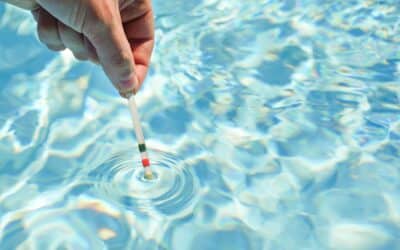As the days get longer and warmer, you are probably thinking about opening up your pool for the season. Dreaming of the afternoons when you hop in for a dip or are lounging by the calm water reading a book, you peel off the cover and look inside. When was the last time you had the water replaced?
This is a question plenty of pool owners ask themselves, especially if there is a peculiar scent coming from the water. The simple answer is that there are a lot of factors that influence how often you should change the water in your pool. These include the following:
Your Maintenance Routine
Keeping up with a maintenance schedule is the best way to keep the water clean and sparkling. A few things can influence the way you care for your pool, most notably how often it is used and maintained. Frequent swimmers can mean sunscreen, makeup, and sweat can mix in with your water, indicating you should have a robust cleaning routine. Combining the right combination of chemicals to maintain the pH balance is key to keeping the water free of algae and bacteria. Your filter should be in good condition and replaced when damaged or past its lifespan. A pool vacuum cleans out any additional debris not caught by your filter, creating a complete cleaning system that is sure to keep your water pristine.
The Climate and Environment
Several outside factors can influence the cleanliness of your pool and, by extension, the condition of the water. Rain contains various minerals that can be introduced during a downpour and cause a pH imbalance. Any branches that fall in the pool can carry spores that might cause fungal problems. Even hot days can harm the pool water. The UV rays emitted by the sun will absorb chlorine particles, leaving it slightly defenseless. Under these conditions, algae has an opportunity to bloom without the presence of chemicals and flourishes under the sunlight. You should keep your pool covered as much as possible when it is not in use to protect it from any of these things happening.
Hard Water vs. Soft Water
The type of water in your pool is perhaps one of the biggest deciding factors on when you need to replace it. Hard water contains more calcium and magnesium ions which are helpful against corrosion. However, if the water is too hard because it has too many of these ions, it can break down metal fixtures. Soft water pools usually appear cleaner and contain fewer minerals, but it has sodium ions that are attracted to calcium, and they can be ruthless when looking for it, stripping away concrete, tiles, and even vinyl lining. It is important to check your total dissolved solids (TDS) level which measures the minerals in your pool. Once this measurement reaches 1,500 ppm, you will likely have no choice but to replace the water.
Choosing to change your pool water is an important decision influenced by many factors. Most experts recommend it be replaced every five to seven years. The best time to do it is in the spring or fall when temperatures are milder and the sun is unlikely to cause any damage. At Benson Pools, we are happy to help you by opening your pool and conducting an inspection if you think it might be time to change the water. The advice of our team of professionals will ensure you make the best decision for you and your family so you can enjoy your backyard oasis for the season ahead. If you want to learn more about our services, please contact us.


